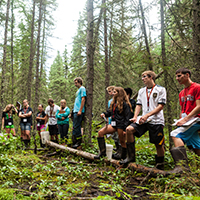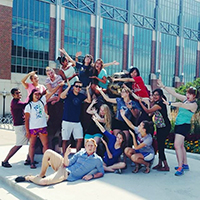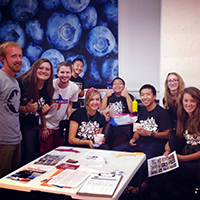The Nature of Life series helps CBS undergraduate students build community, create connections, and develop the skills, self-awareness, and habits of mind that research shows contribute to success in college and beyond.
The Nature of Life series is a signature component of a CBS undergraduate education. Since NOL @ Itasca started in 2001, CBS has continued to innovate, develop and enhance Nature of Life. The Nature of Life series now includes 3 main components.
The Nature of Life series consists of three sequential experiences: the Nature of Life Itasca Experience (NOL @ Itasca), BIOL 1805/1806 (NOL–Year One), and BIOL 2905/2906 (NOL–Year Two). Though they are distinct from one another, all Nature of Life series elements share important things in common:
- An emphasis on creating connections within CBS and larger University of Minnesota communities;
- Metacognition and reflective thinking as the ‘learning lever’ and primary mode of assessment; and
- Engagement with the "big questions" of life that guide and motivate students’ educational pursuits, e.g. “Who am I? What do I value? Who do I want to become? How will I get there?”
NOL @ ITASCA
CBS first-year students begin their college careers by completing a four-day trip to the University of Minnesota’s Itasca Biological Station and Laboratories in July prior to the start of their first fall semester. NOL @ Itasca introduces students to college as they complete two academic modules and several short science talks from various faculty, attend sessions about University of Minnesota traditions and history, and begin building connections with their new classmates, faculty, and staff. More information about NOL@Itasca |
BIOL 1805/1806: NOL–YEAR ONE
Back on campus, students engage with their new CBS community through NOL - Year One, a two-semester academic course where they connect with key campus resources, build relationships with their peers, and practice metacognitive thinking that supports their academic success. As part of NOL - Year One, students become members of a Guild where they tackle a small-group Biology Saves the World Challenge. The Guilds serve as a home base and source of community from students’ earliest moments on campus, continuing throughout their career in CBS. CBS Guilds • Biology Saves the World |
BIOL 2905/2906: NOL–YEAR TWO
The Nature of Life series has evolved to extend the support critical to our first-year students to students in their second year, when we know they begin to experience new and unique challenges related to their academic, personal, and professional goals. The two-year structure of the NOL series positions CBS as a leader in the University-wide initiative to better support second-year students’ success, and its highly individualized course design allows students to tailor the curriculum to match their individual needs and goals. CBS Guilds |